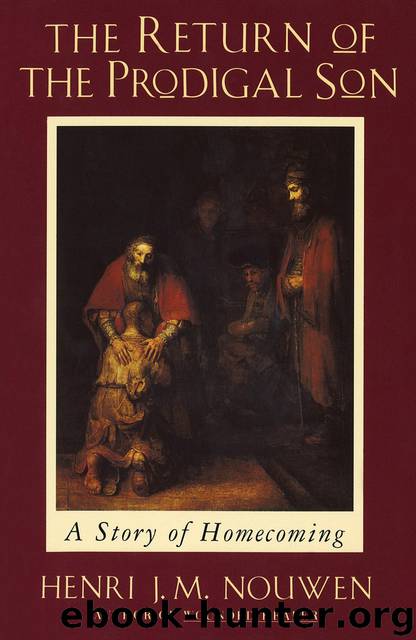The Return of the Prodigal Son by Henri J. M. Nouwen

Author:Henri J. M. Nouwen [Nouwen, Henri J. M.]
Language: eng
Format: epub
ISBN: 9780804152129
Publisher: The Crown Publishing Group
Published: 2013-11-20T05:00:00+00:00
6
THE ELDER SON’S RETURN
The elder son … was angry then and refused to go in, and his father came out and began to urge him to come in …
The father said, “My son, you are with me always, and all I have is yours. But it was only right we should celebrate and rejoice, because your brother here was dead and has come to life; he was lost and is found.”
A Possible Conversion
The father wants not only his younger son back, but his elder son as well. The elder son, too, needs to be found and led back into the house of joy. Will he respond to his father’s plea or remain stuck in his bitterness? Rembrandt, too, leaves the elder brother’s final decision open to question. Barbara Joan Haeger writes: “Rembrandt does not reveal whether he sees the light. As he does not clearly condemn the elder brother, Rembrandt holds out the hope that he too will perceive he is a sinner … the interpretation of the elder brother’s reaction is left up to the viewer.”
The open-endedness of the story itself and Rembrandt’s depiction of it leave me with much spiritual work to do. As I look at the lighted face of the elder son, and then at his darkened hands, I sense not only his captivity, but also the possibility of liberation. This is not a story that separates the two brothers into the good and the evil one. The father only is good. He loves both sons. He runs out to meet both. He wants both to sit at his table and participate in his joy. The younger brother allows himself to be held in a forgiving embrace. The elder brother stands back, looks at the father’s merciful gesture, and cannot yet step over his anger and let his father heal him as well.
The Father’s love does not force itself on the beloved. Although he wants to heal us of all our inner darkness, we are still free to make our own choice to stay in the darkness or to step into the light of God’s love. God is there. God’s light is there. God’s forgiveness is there. God’s boundless love is there. What is so clear is that God is always there, always ready to give and forgive, absolutely independent of our response. God’s love does not depend on our repentance or our inner or outer changes.
Whether I am the younger son or the elder son, God’s only desire is to bring me home. Arthur Freeman writes:
The father loves each son and gives each the freedom to be what he can, but he cannot give them freedom they will not take nor adequately understand. The father seems to realize, beyond the customs of his society, the need of his sons to be themselves. But he also knows their need for his love and a “home.” How their stories will be completed is up to them. The fact that the parable is not completed makes it certain that the father’s love is not dependent upon an appropriate completion of the story.
Download
This site does not store any files on its server. We only index and link to content provided by other sites. Please contact the content providers to delete copyright contents if any and email us, we'll remove relevant links or contents immediately.
Resisting Happiness by Matthew Kelly(3337)
The Social Psychology of Inequality by Unknown(3018)
Day by Elie Wiesel(2779)
Designing Your Life by Bill Burnett(2740)
The Giving Tree by Shel Silverstein(2336)
Human Design by Chetan Parkyn(2068)
The Supreme Gift by Paulo Coelho(1962)
Angels of God: The Bible, the Church and the Heavenly Hosts by Mike Aquilina(1954)
Jesus of Nazareth by Joseph Ratzinger(1811)
Hostage to the Devil by Malachi Martin(1800)
Augustine: Conversions to Confessions by Robin Lane Fox(1769)
7 Secrets of Divine Mercy by Vinny Flynn(1735)
Dark Mysteries of the Vatican by H. Paul Jeffers(1704)
The Vatican Pimpernel by Brian Fleming(1699)
St. Thomas Aquinas by G. K. Chesterton(1632)
Saints & Angels by Doreen Virtue(1603)
The Ratline by Philippe Sands(1569)
My Daily Catholic Bible, NABRE by Thigpen Edited by Dr. Paul(1496)
Called to Life by Jacques Philippe(1475)
